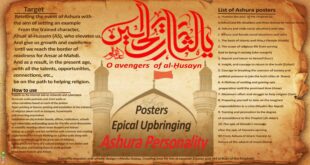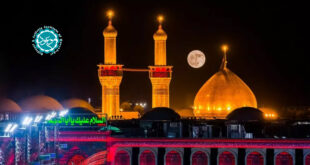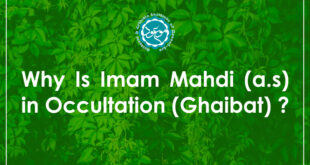The Consequence of Transferring Caliphate and its Tendency toward the ‘Alawis
The jealous and the world adorers in different parts of the Islamic Empire whose hands were stained with the innocents’ blood and who enjoyed well-to-do and luxurious lives were discontent with such a transfer. They knew well that Imam al-Ridha (as) would not tolerate tyranny and oppression for even a single moment.
This ‘Ali [b. Musa al-Ridha] (as) is the son of the same ‘Ali (as) who did not value the worldly matters and the caliphate, and if he accepted to rule, it was because he regarded it as a means for restoring and carrying out justice, serving the society and the oppressed people, and nothing else.
Therefore, this decisive and invincible method could not satisfy the lovers of worldly gaudiness and the servile flatterers. Ma’mun, his vizier and cronies tried from the very beginning to misrepresent the acceptance of crown princeship by Imam al-Ridha (as) as a weak point and convince people that he was infatuated with worldly issues and the superfluous attractions. Far from it! How this way of thinking was far from the sublime goal of the Holy Imam (as).
Anyhow, the sun of truthfulness would not remain under clouds: Imam‘Ali b. Musa al-Ridha (as)’s simplicity and immaculate behavior as well as his vast field of knowledge and scholarship began to gain more and more popularity, and soon his righteousness and comprehensive learnedness were known to all. Debate sessions held in the presence of Ma’mun and others like the well-known court jurist, Yahya b. Aktham, who boasted of being knowledgeable and well-informed, lighted up the reality of Wilayat and Imamate.
Throughout these debates, everybody, even the leaders of other religions, found out about the extent of the Imam (as)’s omniscience and insight and realized that they had no power of speech and self-expression against the Prophet (S)’s descendants. That was why they had no choice but to surrender to the Imam (as). Perforce, the enemy’s plots to mar the Holy Imam (as)’s status were not only abortive, but they also gave way to a reverse effect.
As an educated and a knowledgeable man, Ma’mun was well-aware of Imam al-Ridha (as)’s spiritual and scholarly elevated position, but suppressed his inner feelings and views and pretended to be caring and friendly toward the Imam (as).
On the ‘Id al-Fitr, 202 A H, Ma’mun implored Imam al-Ridha (as) to lead the congregational prayer. At first, he refused it, so that Ma’mun and his cronies as well as the people might know that he could not and wouldn’t act as a puppet doing what the state intended him to do. Besides, the Imam (as) would not like to be a performer of the ostensible formalities of religion, knowing that the building [of religion] was tottering to its foundation.
Ma’mun, his courtiers, and other people insisted on the Imam (a.s.) to lead the prayer, to which he finally consented on the condition that: “I would lead ‘Id al-Fitr prayer but only with the same tradition that my ancestor, the Apostle of Allah (S) performed it in his own time.” People were very anxious to see that the way of the Prophet (S) would substitute the superfluous ceremony of the court. Ma’mun ordered all courtiers to wear their finest attires, ride on ornamented and gold-bridled horses with all pomp and circumstances to accompany the Imam (as) to participate in ‘Id al-Fitr prayer.
Imam al-Ridha (as), however, performed ablution, wore a simple white cotton shirt, put on a white turban, letting its two ends from over his chest down his shoulder, just in the way his noble ancestor did.
He perfumed himself, fastened the tail of his shirt to his waist, and set off bare-footed. When he reached the open land he called out with a loud voice: Allahu Akbar! Allahu Akbar! (Allah is the Greatest).
When people heard the Imam (as)’s voice, they began to chant Allahu Akbar altogether in a magnificent way, to the extent that the military officials and the civilian nobles as well as the courtiers were so influenced by the Imam (as)’s spiritual attraction that they dismounted from their horses, took off their boots and followed the Imam (as) bare-footed. The number of the crowd mounted minute by minute.
The Imam (as)’s heavenly voice and others’ reverberated in the open air. The congregation was flooding toward the desert [gathering place for saying prayer]. The situation had turned unusual.
The news was reported to Ma’mun. He got perplexed, thinking if he let Imam al-Ridha (as) go on to the desert as such and then deliver his eloquent and important sermons, his fiery words would definitely be accepted whole-heartedly by people and this will tremble the pillars of his governance. Something should be done; for it is probable that the Imam (as)’s influential words would lead to a revolution in the ruling system.
Thus, in the middle of the way, Ma’mun sent a message to the holy Imam (as) stating that performing prayers in such a situation would make trouble for him. The Imam (as) returned from the middle of the way and someone else was appointed to lead the Fitr prayer in his place. God knows how this interference by Ma’mun had added to people’s cynicism toward his monarchy and exposed the true nature of his ruling system.
The Last Intrigues and Deceptions
Some who saw Imam al-Ridha (as)’s just and scholarly manners detrimental to their worldly benefits, began to plot intrigues to annihilate both Imam al-Ridha (as) and Ma’mun as well as Fadhl b. Sahl. First, they Killed Fadhl in the well-known public bath of Sarakhs. In order to exonerate himself from this murder, Ma’mun mobilized his forces to look for and arrest the murderers of Fadhl b. Sahl and even offered an award for their arrest.
Nevertheless, eliminating Fadhl b. Sahl from the political arena was a source of hope for the Abbasids, but it was not sufficient. Thus, Ma’mun sought to assassinate Imam al-Ridha (as), so he poisoned and martyred the noble Imam (as) whom he had himself invited to Khurasan.
Surprisingly enough, Ma’mun and his caliphate system tried to show the Imam (as)’s martyrdom as natural death. He pretended to be extremely sorrowful of that heart-rending event, and that was actually due to his great fear of the followers of the Holy Imam (as) and the descendants of ‘Ali (as).

 Mouood Mouood English Edition
Mouood Mouood English Edition



